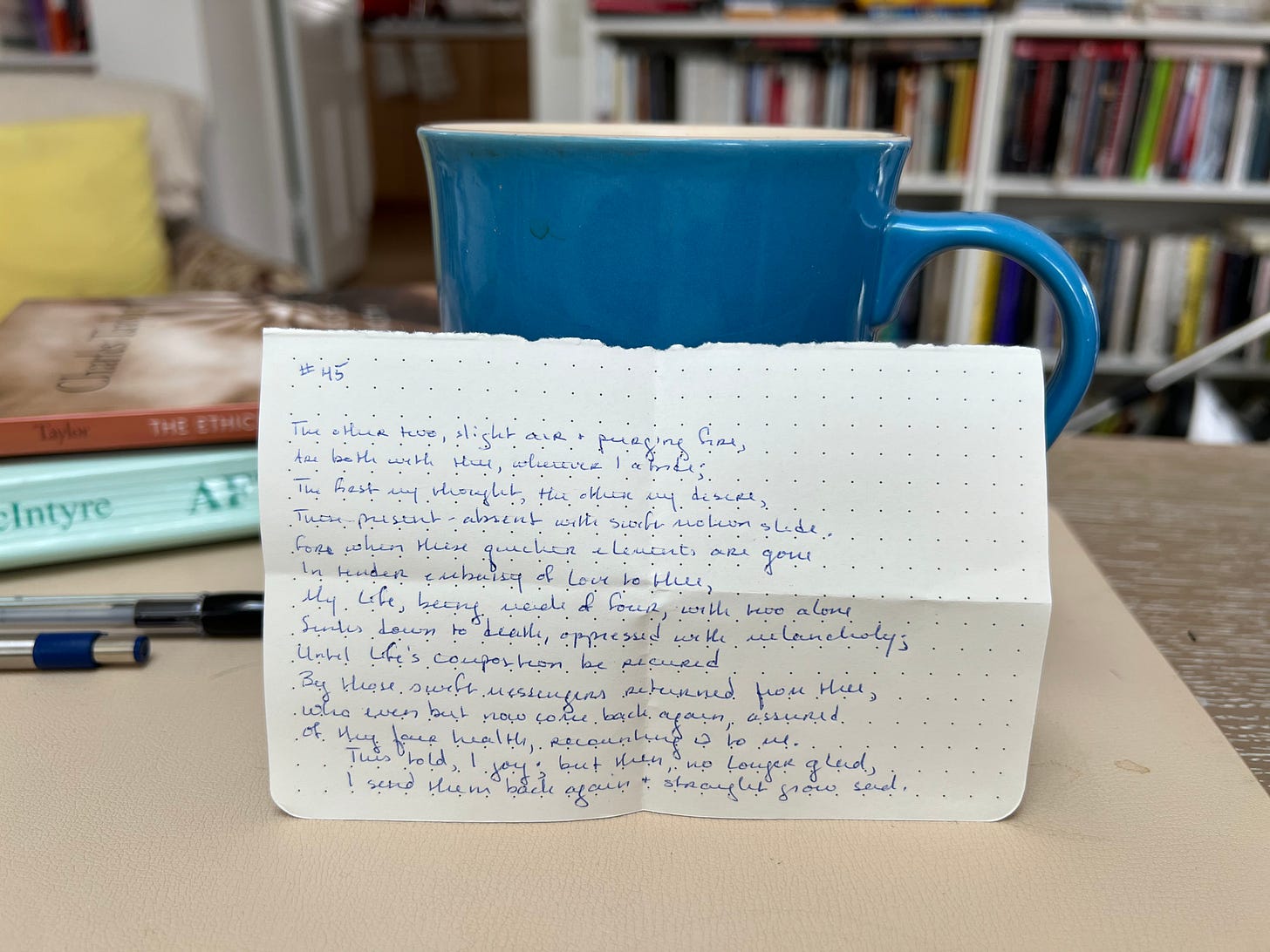How Memorizing Poems Will Change Your Life
And some tips on getting started
On May 4 I’m offering an online seminar on the practicalities of The Writer’s Life. We’ll cover all aspects of a writer’s life: submissions, publishers, finances—building a sustainable career. I’d love for you to join us. Full information and registration at this link.
There’s still time to join us for the second meeting of the To a Green Thought Book Club. We’re meeting on April 20, when we’ll be discussing Isabella Hammad’s Enter Ghost. The bi-monthly meetings are open to anyone who supports this newsletter as a Founding Member. To subscribe or upgrade, just click on the Subscribe button below. For more thoughts on why book clubs are my favorite form of human interaction, click here.
I’m very grateful for this moving reflection by Madeleine Wulfahrt in LitHub on Small Rain and the challenges of writing hospitals and the bodies they care for. “The resulting novel is a kind of epic in miniature—one which recognizes the hospitalized body as a site of poetry, contemplation, and love.”
In this month’s issue of Texte zur kunst, the editor Isabelle Grawe recommends Small Rain: “He says he aims to capture objects in their time while simultaneously pointing beyond it—to anchor his writing in time while also making it timeless. I see him as having succeeded in this respect with his book, which takes into account its protagonist’s singular history of illness as well as the social conditions bound up with it … Greenwell repeatedly shows the specific to be universal by interweaving the particular with the social and structural.”
*
It’s not hyperbole; I really mean it. Certainly it will change your writing life. A couple of weeks ago, I was having lunch with one of my favorite novelists here in Iowa City, and she was talking about reading George Herbert, one of my very favorite poets, and getting especially caught up with his poem “A Wreath.” Do you know that one? Here’s how it starts:
A Wreathed garland of deserved praise,
Of praise deserved, unto thee I give,
I give to thee, who knowest all my wayes,
My crooked winding wayes, wherein I live…
It goes on like that for eight more lines, the poem enacting its own metaphor, weaving the end of each line into the beginning of the next. “I keep wondering how I can get that into my prose,” my friend said, though she didn’t have any idea what that would look like. That desire, to get something into your writing and not knowing how to do it: that’s how innovation happens; it’s how you become a better writer. This is a point I’ve been making in my style seminars for ages: engaging with other arts (poetry, painting, music) and trying to find correlatives for what moves you in their technical resources—that’s a great way to prompt genuine invention in your own art.
This is why, ever since I began teaching fiction, I’ve emphasized poetry in my workshops; and it’s why I’ve always told my students that among the two or three most powerful things a writer can do to improve their style is to memorize poems. (I wrote about other practices that I think improve style in this post.) It also makes you a better reader. When you carry around Shakespeare’s sonnets or Keats’s Odes in your head, you start to see them everywhere, how they permeate the literature that comes after them; you start to see how poems have secret handshakes with other poems; you feel how every poem you’ve read enriches every poem you read.
But it isn’t just about being a better writer or a better reader; memorizing poems makes you a better person. Not in a moralistic sense (though maybe it helps with that too), but something more fundamental: It will improve how you inhabit your own existence.

